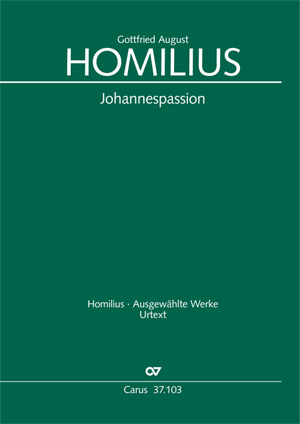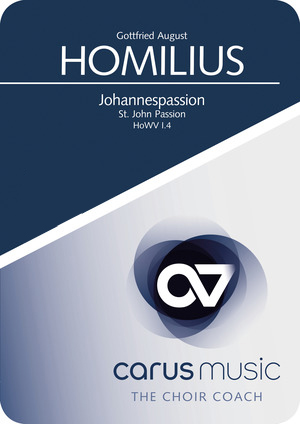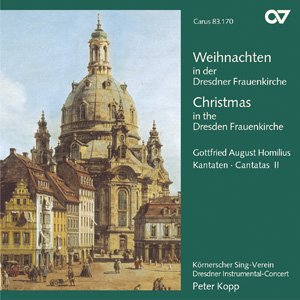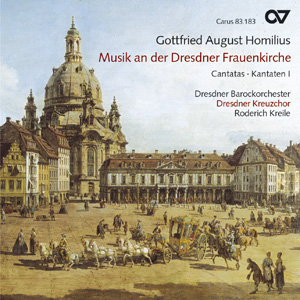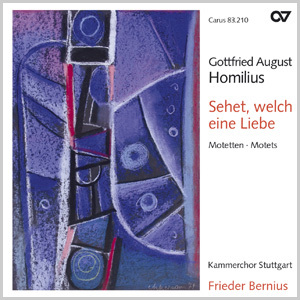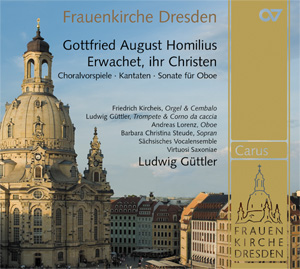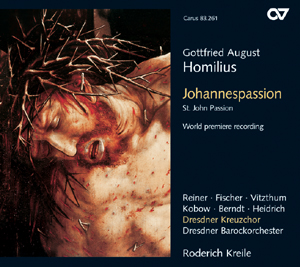
Contents
-
Composer
Gottfried August Homilius
| 1714-1785Gottfried August Homilius, the son of a pastor, was born in Rosenthal (Saxony) on 2 February 1714. In May 1735 he enrolled as a law student at Leipzig University. Likewise, it was probably at this time that Homilius was a pupil of Johann Sebastian Bach; the latter fact had been attested to by Johann Adam Hiller. Apart from Bach, Homilius also had contact with Johann Schneider, a Bach pupil and organist at the Nicolaikirche, for whom he also substituted. After unsuccesfully applying for a post as organist in Bautzen, Homilius was appointed organist at the Dresden Frauenkirche in 1742. In 1755 Homilius succeeded Theodor Christlieb Reinhold as Kreuzkantor and music director of the three main churches in Dresden, a position that he occupied until his death on 2 June 1785. Personal details
-
Preface writer
Uwe Wolf
| 1961Uwe Wolf studied musicology, history, and historical ancillary science at Tübingen and Göttingen. After receiving his doctorate in 1991 he was a research assistant at the Johann-Sebastian-Bach-Institut in Göttingen. From 2004 he worked at the Bach-Archiv Leipzig. There he directed a both research departments, was substantially responsible for the redisigning of the Bach Museum, and he developed the digital Online-Projekt Bach. Since October 2011 he has been the Chief Editor at Carus-Verlag, Stuttgart. He has taught at various universities and also belongs to the editorial boards of several complete editions. Personal details
-
Ensemble
Dresdner Kreuzchor
The Dresden Kreuzchor is one of the world’s oldest and most famous boys’ choirs. Its most important task in its 800 years of existence is still the musical accompaniment of the vespers and services at Dresden’s Kreuzkirche. Not only on religious holidays but also throughout the entire church year the Kreuzchor accompanies half of all liturgical services in the famous church on the old market. The impressive architecture of the Kreuzkirche is an added attraction for the 3000 spectators of its choir concerts. As the city’s oldest and critically acclaimed cultural institution, the Dresden Kreuzchor has marked Dresden’s musical life in a very special way and spreads the city’s reputation as a cultural metropolis throughout the world as one of its most prominent ambassadors. Several times a year, the Dresden Kreuzchor goes on national and international concert tours beyond Germany and Europe’s borders to Israel, Canada, Japan, South America and the USA. Moreover, it performs at international music festivals as well as on countless radio and television recordings. A very wide repertoire ranging from early Baroque to world premieres of contemporary music has enabled it to make more than 800 recordings in the last 80 years for prestigious record labels such as Deutsche Grammophon, Teldec, Capriccio and Berlin Classics. There is a constant cooperation with famous orchestras such as the Dresden Philharmonic and the Sächsische Staatskapelle Dresden. Renowned opera houses regularly employ members of the choir as soloists for roles such as the three boys in the Magic Flute. The Kreuzchor singers, called “Kruzianer,” still pursue their education and graduate from the Kreuzschule; about half of them live in the adjacent boarding school. In addition to their regular classes, the 150 singers aged nine to eighteen have weekly singing and instrumental lessons. Their daily rehearsals and the specific sound of the choir are the basis of the success and the fame of the Dresden Kreuzchor. Personal details
-
Orchestra
Dresdner Barockorchester
One of the distinguishing features of the Dresdner Barockorchester, founded in 1991, is the fact that its membership includes both early music specialists and orchestral musicians drawn from the Dresdner Staatskapelle and the Dresdner Philharmonie. Working together with baroque instruments, with their specific clarity of sound and articulation they achieve a variegated, eloquent music-making in which their different areas of musical experience are combined. The musicians are united in their desire to follow the splendid example set by the Dresden Court Orchestra of Augustus the Strong. The heritage of that era is the music of such conductors and instrumentalists of the Court Orchestra as Hasse, Heinichen, Zelenka, Quantz and Pisendel, whose works have a prominent place in the repertoire of the Dresdner Barockorchester. This repertoire extends from the end of the 17th century through Mozart. The Dresdner Barockorchester works closely with the Dresdner Kammerchor and its conductor Hans- Christoph Rademann. Personal details
-
Conductor
Roderich Kreile
For centuries the position as cantor of the Dresdner Kreuzchor (Choir of the Church of the Holy Cross) has been among the most honorable and renowned positions in Protestant church music. Roderich Kreile has served as the 28th post-Reformation cantor of the Dresdner Kreuzchor since 1997. He was born in 1956 and studied church music and choral conducting in Munich. Roderich Kreile quickly achieved nationwide recognition as a church musician. He taught at the Munich Conservatoire between 1989 and 1996, eventually as a professor, and led two choirs. Furthermore, in 1994 he took over the position as Director of the Munich Philharmonic Choir. As an organist and tutor he has received invitations from both within Germany and from abroad. Kreuzkantor Roderich Kreile all music performances in the church as well as the concerts and tours of the Dresdner Kreuzchor. There, he has established with the members of the choir – named “Kruzianer” –, a wide-ranging repertoire of religious and secular choral works from throughout the history of music. In the last few years he has given many compositions their first performances. He has also strengthened ties with renowned orchestras and produced numerous radio and CD recordings. In previous centuries the area of responsibility of the cantor of the Dresdner Kreuzchor was concentrated primarily on the leadership of the religious services, as is still the case. Nowadays, however, the remit of the Kantor far exceeds purely artistic responsibility; as the leader of the Dresdner Kreuzchor, Roderich Kreile also has the responsibility of being a community representative. Personal details
-
Soloist - soprano
Katja Fischer
Katja Fischer absolvierte ihr Gesangsstudium in Dresden bei Regine Köbler. Als Interpretin von Opernliteratur trat sie wiederholt im Rahmen der Dresdner Musikfestspiele auf. Die Zusammenarbeit mit Dirigenten wie Ekkehard Klemm, Roderich Kreile, Hans-Christoph Rademann, Ludger Rémy sowie Meisterkurse bei Olaf Bär, Andreas Schmidt und Ruth Ziesak bereicherten ihr musikalisches Profil. Besondere Aufmerksamkeit widmet die Sopranistin der Erschließung klassischen Oratorienrepertoires und der Alten Musik. Personal details
-
Soloist - soprano
Jana Reiner
Jana Reiner studierte von 1994 bis 2001 in Dresden Gesang bei Ilse Hahn und Heidi Petzold und nahm an Meisterkursen bei Semjon Skigin, Brigitte Fassbaender, Elisabeth Schwarzkopf und Klessie Kelly teil. Nach einem Festengagement ab 2002 am Theater Plauen-Zwickau ist Jana Reiner seit 2004 freischaffend als Konzert- und Opernsängerin tätig und arbeitete mit verschiedenen Barockorchestern in Dresden, Chemnitz und Leipzig, mit der Sächsischen Staatskapelle Dresden, der Robert-Schumann-Philharmonie Chemnitz und der Sinfonia Varsovia zusammen. Konzertreisen führten sie in viele deutsche Städte und ins europäische Ausland. Personal details
-
Soloist - countertenor
Franz Vitzthum
FThe former Regensburger Domspatz Franz Vitzthum received his vocal studies with Kai Wessel in Cologne. He regularly appears as a guest at international festivals and has worked together with such conductors as Nicolas McGegan, Hermann Max, Marcus Creed and Philippe Herreweghe. As a much sought-after chamber musician, he performs concerts together with the lutenist Julian Behr, the Capricornus Consort Basel and his vocal ensemble Stimmwerck. Personal details
-
Soloist - tenor
Jan Kobow
-
Soloist - tenor
Stephan Keucher
-
Soloist - tenor
Christian Lutz
-
Soloist - bass
Tobias Berndt
Tobias Berndt began his musical education in the Dresden Kreuzchor. He studied with Christian Polster in Leipzig and continued his training with Rudolf Piernay in Mannheim. He also studied with Dietrich Fischer-Dieskau and Thomas Quasthoff. He was a laureate in numerous renowned singing competitions, winning – among others – the International Das Lied Competition in Berlin, the International Brahms Competition and the Cantilena Singing Competition. Tobias Berndt has also established himself abroad as an opera and concert singer. He has collaborated with conductors such as Philippe Herreweghe, Helmuth Rilling, Frieder Bernius, Teodor Currentzis, Marcus Creed, Hans-Christoph Rademann, Andrea Marcon, Marek Janowski and Sir Roger Norrington and has performed at the Berliner Philharmonie, the Tonhalle in Zurich, the Concertgebouw Amsterdam, the Leipzig Gewandhaus, the Tchaikovsky Concert Hall in Moscow, the Teatro Colon in Buenos Aires and at Lincoln Center in New York. He has also performed at important festivals such as the Prague Spring, the Rheingau Musik Festival, the Händel Festivals in Göttingen und Halle, the Bachfest Leipzig, the Oregon Bach Festival and the International Music Festival in Peking. An extensive discography attests to his versatile artistic activities. Personal details
-
Soloist - bass
Clemens Heidrich
Clemens Heidrich received his first musical training in the Knabenchor Dresden and later in the special music class at the Lessing-Gymnasium Hoyerswerda, Saxony. He graduated from the Hochschule für Musik “Carl Maria von Weber” in Dresden in 2002. Since then he has worked as a freelance singer, mainly in concert work. He has toured to Antwerp, Bergen (Norway), Jerusalem, Lisbon, Paris and to the “La folle journée” Festival in Tokyo. Clemens Heidrich has worked with ensembles including the Akademie für Alte Musik Berlin, Dresdner Barockorchester, Dresdner Kammerchor, Das Kleine Konzert, Kammerphilharmonie Bremen, Dresdner Kreuzchor, Dresdner Singakademie, Rheinische Kantorei and the Sächsische Staatskapelle Dresden. Personal details
Reviews
[…] direct, attractive and accomplished.
BBC Music Magazine, April 2014
Der Chor präsentiert sich bei den Chorälen und der Darstellung der Volksmenge als äußerst flexibler und wacher Klangkörper, der mit höchster Präzision den "galanten", an manchen Stellen etwas süßlich, musikalisch oberflächlich wirkenden Gestus der Musik zu interpretieren weiß. Das Dresdner Barockorchester unterstreicht dies mit vielen klangschönen Momenten und intelligenten Phrasierungen und bestätigt den Ruf als Spezialensemble für die Interpretation auf historischen Instrumenten.
Emanuel Scobel, Neue Chorzeit, Juli/August 2007
Der Dresdner Kreuzchor mit seinen Knabenstimmen zeigt sich unter der Leitung von Roderich Kreile bestens disponiert und in Hochform.
Dr. Franz Gratl, klassik.com, 18.05.2007
Frequent questions about this work
 There are no questions and answers available so far or you were unable to find an answer to your specific question about this work? Then click here and send your specific questions to our Customer Services!
There are no questions and answers available so far or you were unable to find an answer to your specific question about this work? Then click here and send your specific questions to our Customer Services!


